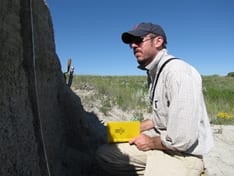The research of SMU fire anthropologist Christopher I. Roos was covered by the popular Climate Central blog. In a June 2 entry, Climate Central science journalist Andrew Freedman wrote about the record-breaking megafires burning now in New Mexico and referenced new ancient fire research by Roos. The study by Roos found that U.S. megafires in the U.S. Southwest region are unique and exceptional for the past 1,500 years.
Roos and co-author Thomas W. Swetnam, the University of Arizona, constructed and analyzed a statistical model that encompassed 1,500 years of climate and fire patterns to test, in part, whether today’s dry, hot climate alone is causing the megafires that routinely destroy millions of acres of forest.
The researchers found that even when ancient climates varied from each other — one hotter and drier and the other cooler and wetter — the frequencies of year-to-year weather patterns that drive fire activity were similar.
The findings suggest that today’s megafires, at least in the southwestern U.S., are atypical, say Roos and Swetnam. Furthermore, the findings implicate as the cause not only modern climate change, but also human activity over the last century, the researchers said.
EXCERPT:
By Andrew Freedman
Climate Central
The largest wildfire in New Mexico’s history continues to burn, having already charred an area larger than New York City. Known as the Whitewater-Baldy Fire Complex, the wildfire has become another in a series of “megafires” to torch the American West due to an unprecedented combination of drought conditions, climate change, and alterations in land-management practices. To make matters worse, according to The Guardian newspaper, congressional budget cuts may restrict the federal government’s firefighting efforts during what is widely expected to be a busy wildfire season.The Whitewater-Baldy Complex is burning in New Mexico’s rugged and mountainous Gila Wilderness, an area with steep terrain that has rendered much of the fire off limits to firefighters. Instead of attacking it from within, firefighters are trying to dig in around it, hoping to slow its spread. […]
[…] In fact, the recent Southwestern megafires stand out as unusual in the context of the past 1,500 years in that region, according to a recent study. The study found that land-management changes, such as years of fire suppression activities that stifled small fires, thereby priming forests for larger blazes, have combined with climate change to create forests that are altogether different — and which burn differently — from what existed in this area for generations.
“The U.S. would not be experiencing massive large-canopy-killing crown fires today if human activities had not begun to suppress the low-severity surface fires that were so common more than a century ago,” said Christopher I. Roos, an assistant professor in the SMU Department of Anthropology, according to Science Daily.
SMU is a nationally ranked private university in Dallas founded 100 years ago. Today, SMU enrolls nearly 11,000 students who benefit from the academic opportunities and international reach of seven degree-granting schools. For more information see www.smu.edu.
SMU has an uplink facility located on campus for live TV, radio, or online interviews. To speak with an SMU expert or book an SMU guest in the studio, call SMU News & Communications at 214-768-7650.



 Ancient tree-ring records from southwest U.S. suggest today’s megafires are truly unusual
Ancient tree-ring records from southwest U.S. suggest today’s megafires are truly unusual Middle school boys who are reluctant readers value reading more after using e-readers
Middle school boys who are reluctant readers value reading more after using e-readers Dark matter search may turn up evidence of WIMPS: SMU Researcher Q&A
Dark matter search may turn up evidence of WIMPS: SMU Researcher Q&A Modeling the human protein in search of cancer treatment: SMU Researcher Q&A
Modeling the human protein in search of cancer treatment: SMU Researcher Q&A